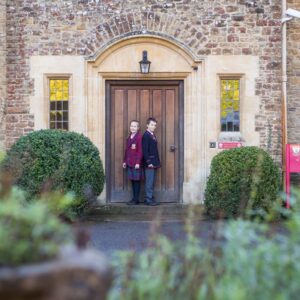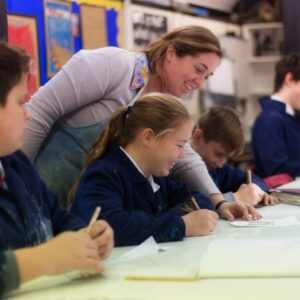Learning
Pupils are taught as a class for subjects, except for English, maths and science, which are set by ability. In Years 7 and 8, subjects are set where the need arises. We monitor the children’s progress closely, looking to support and extend each individual child. The children are involved in their own target setting, regularly reviewing their progress and looking to challenge themselves. Sets are not static and are constantly reviewed with children moving between groups throughout the year.
Presentation of Work
All Barrow Hills children are expected to take pride in their work and present it to their best of their ability. In Years 7 and 8 children are expected to write in a blue handwriting pen, as instructed by their teacher. Maths is completed in pencil. Diagrams should be drawn in pencil, as should label lines, and dates and headings should be underlined with a ruler. Children are expected to keep their books, folders and Chromebook cases free from graffiti and stickers.
Use of Chromebooks
Each child in Years 7 and 8 is provided with a chromebook to support their learning and to help them with their organisation. They are able to access their timetables, calendars and team sheets. Teachers may share learning resources electronically with children via Google Classroom.
Children should remember that the chromebooks are registered on our Google admin console and that the School regularly monitors the user history of each device and chromebooks will be withdrawn if it is felt they are being used inappropriately. Parents need to control wifi access at home.
All children will be required to sign a pupil chromebook agreement form which will clearly state acceptable use of the chromebooks. Emails to and from children are restricted and can only be sent and received from the Barrow Hills domain.
Homework
Children are expected to complete their homework as a priority each evening. Each subject is set according to the Prep Timetable and children are encouraged to spend 30 minutes on each subject. Homework may take different forms: children may be asked to finish classwork or to complete an activity that tests their understanding of a particular topic; they may be asked to prepare for a future lesson by conducting research or watching a short film clip; they may be asked to edit and improve an existing piece of work. Homework instructions and resources will be shared with children in Google Classroom.
We also encourage children to read aloud to a parent or adult at home wherever possible.
Testing and Assessment
Teachers will use a variety of informal assessment methods to ensure that their teaching is focused on children’s learning needs. These may include observation, questioning and the marking of written work. There are also various formal assessments throughout the year. These tests not only give us information on children’s learning but also provide them with the opportunities to develop important revision and examination skills.
In Year 7 take Cognitive Ability Tests (CAT4). In the summer term, the children sit assessments in all academic subjects.
At the start of Year 7, children begin their Common Entrance syllabus in English, maths, science, R.E, geography, history, French and Latin. When in Year 8, they sit a full set of examinations with mock Common Entrance papers in February, and the actual examinations in June.
Back to Handbook



